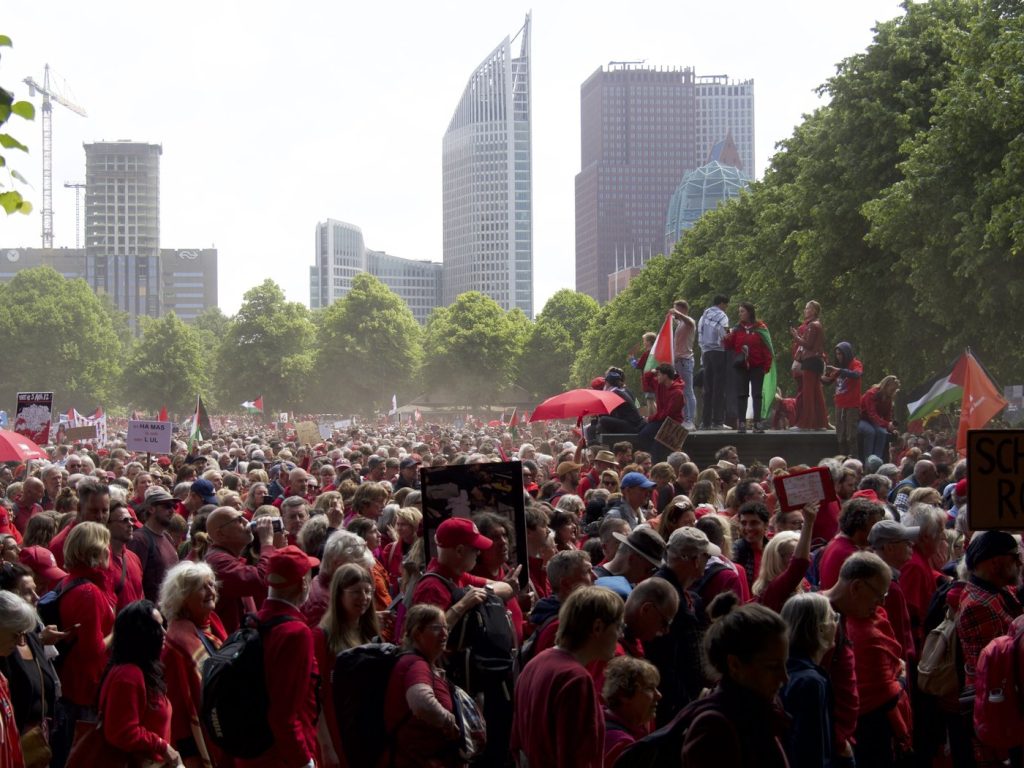On Sunday, May 18, 2025, The Hague, Netherlands, witnessed a significant protest as tens of thousands of red-clad demonstrators marched through the capital, calling for greater governmental action to halt Israel's military campaign in Gaza. This demonstration is reported to be the largest in the Netherlands in two decades, with human rights organizations and aid agencies such as Amnesty International, Save the Children, and Doctors Without Borders estimating the crowd at over 100,000 participants. The streets were overflowing with people of various ages, including families with young children, marking a significant moment in Dutch civic activism.
Among the attendees was Roos Lingbeek, a teacher who participated in the march with her husband and their 12-week-old daughter, Dido. Roos carried a sign that simply read "STOP," while her daughter slept peacefully in a carrier. Lingbeek expressed hopes that the protest would serve as a wake-up call to the government regarding the ongoing humanitarian crisis in Gaza.
The protest path took the crowd past prominent landmarks such as the Peace Palace, which houses the United Nations' International Court of Justice. It was here that judges issued a ruling last year mandating Israel to take all possible measures to prevent loss of life, destruction, and any acts that could be classified as genocide in Gaza. As the demonstrators marched past these significant sites, Israeli forces were intensifying their ground operations in northern Gaza, with airstrikes reportedly resulting in the deaths of at least 103 individuals, including many children, and leading to the closure of Gaza's main hospital due to heavy bombardment.
The ongoing Israeli blockade of essential supplies such as food and medicine has now reached its third month, raising alarms among global food security experts who warn of impending famine for the over 2 million residents in the affected territory. Protester David Prins, whose yarmulke featured an image of a watermelon—echoing the colors of the Palestinian flag—voiced his attendance at the protest as a stand against the atrocities occurring in Gaza. A longtime member of the Jewish community, he stood near the synagogue where he had worshiped as a child, underlining the community's outcry against the violence.
During the march, protesters completed a symbolic 3-mile (5-kilometer) loop around the city center, visually creating a 'red line' that represented the moral stand they believe the government has failed to establish. Activists called on the Dutch government to cease all forms of political, economic, and military support to Israel, accusing it of obstructing humanitarian aid to Gaza. Marjon Rozema from Amnesty International emphasized the urgent need for the government to respond to the humanitarian crisis, urging them to rethink their relationship with Israel.
Support for the protest was evident even among those who could not participate in the march itself, with individuals lining the streets to cheer on the demonstrators. Aletha Steijns, who was unable to march due to a knee injury, expressed her sentiments by stating, "It’s beyond time for the government to act," demonstrating the widespread frustration surrounding the current political climate.
The issue of Dutch policy toward Israel has become increasingly contentious within the country's fragile coalition government. The far-right leader Geert Wilders, who leads the anti-immigrant Party for Freedom, remains a staunch ally of Israel and holds the largest number of seats in parliament. Tensions within the coalition were further highlighted when Foreign Affairs Minister Caspar Veldkamp from the minority center-right VVD party recently suggested that the European Union should reconsider a trade agreement with Israel, asserting that the blockade of humanitarian aid constitutes a violation of international law. This statement was met with criticism from Wilders, who condemned it as detrimental to the government's established policy.











